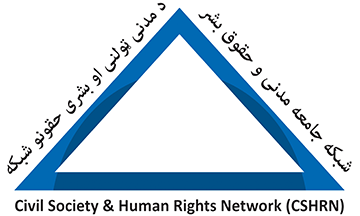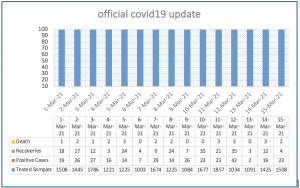Bi-weekly Situation Report
No. 5 (March 01, 2021 – March 15, 2021)

Civil Society and Human Rights Network
Purpose:
This bi-weekly report describes the updates and challenges related to the government’s relief response program, known as Dastarkhan-e-Meli, and health assistance in combating Covid-19 in Afghanistan.
Time Coverage: The report covers all the measures undertaken from March 01 to March 15, 2021, by the government in Afghanistan concerning health and humanitarian assistance during the Covid-19 pandemic.
Situation Overview:
- Covid-19 New Update:During this period, the official report indicates several new positive tests, recoveries, and deaths. Due to a weak health system and mismanagement, however, more people prefer home-based treatment. As a result, it has made it difficult to track the exact numbers of positive cases.

- In February 2021, Afghanistan received around 500,000 doses of Covid-19 vaccines to contain further spread of the pandemic across the country. Before long, the doses have been distributed to several provinces such as Laghman received 5300 doses, Helmand 20,000, Logar 5695, Jowzjan 6170, Paktia 12370, Herat 28880, Bamiyan 2890, Balkh 12500, and Nangarhar 24620 doses. Following the shipment of Indian Covid-19 vaccines to Afghanistan, on March 8, 2021, the country received the second shipment of 468,000 doses of the COVISHIELD Covid-19 vaccines. However, unconfirmed reports from Bamiyan stated that a medical worker died shortly after testing the Covid-19 vaccine. It is not yet clear whether or not the Indian AstraZeneca’s donated vaccine has caused the death.
- Challenges in implementation of Datarkhan-e-Melli:
- Bamiyan province:
Following the Dastarkhan-e-Melli program, the reports confirmed serious mismanagement and lack of transparency in aid distribution to the needy families in Bamiyan province. According to CSHRN’s focal point in Bamiyan, the internally displaced people from Lal-Sarjangal and Yakawlang districts to the central province have been denied to receive aid packages. In addition, those families who took refuge in Bamiyan following the ongoing armed conflict in the neighboring Wardak province, have also been denied to receive humanitarian assistance under the Dastarkahn-e-Melli. Dozens of those displaced people referred to the provincial office of CSHRN in Bamiyan and shared their grievances. They also faced mistreatment by the provincial authorities in Bamiyan while asking for aid assistance. CSHRN’s focal point in the province has shared the problems with the authorities in Bamiyan, however, no satisfactory response was provided.
- During the reporting period, in some provinces such as Ghor, Paktia, Logar, and Helmand provinces, the Dastarkhan-e-Melli program has faced unpleasant security challenges from the Taliban. Particularly, in Paktia province, the Taliban threatened the aid workers not to distribute the aid packages and would be targeted otherwise. While in Logal province, Dastarkhane-e-Melli resumed in Kolangar district which was previously suspended. In Qalacha and Nejrab districts of Kapisa, the aid packages distribution also resumed after weeks of suspension.